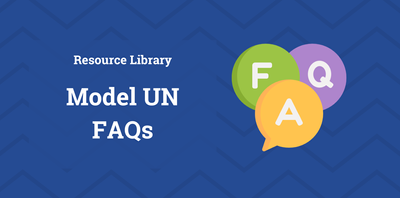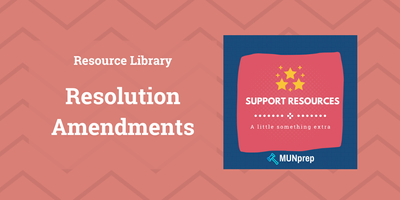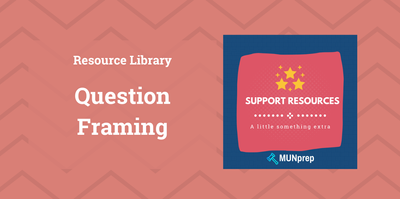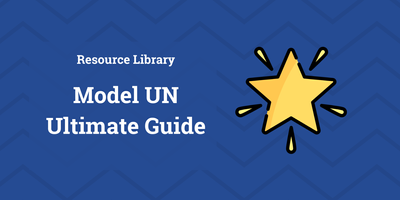The Awards Handbook: How to Stand Out in MUN

MUN Awards
Winning awards in Model United Nations (MUN) is an exciting accomplishment, but it’s also a reflection of the skills and dedication you bring to the conference. Whether you’re striving for individual recognition or hoping to showcase your team’s collective effort, understanding the types of awards and what it takes to earn them is key.
In this guide, we’ll explore the awards you can get in MUN, discuss strategies to increase your chances of success, and help you navigate the conference experience to stand out as a leader.
Awards may be the goal, but its only the final step after a lot of commitment has gone into preparing for your conference.
This is one of our most in-depth guides ever - so feel free to save it and come back later when you need more tips!
PART 1: Different Awards You Can Get in Model UN
Model United Nations (MUN) conferences often recognize delegates with a range of awards that celebrate both individual achievement and overall delegation performance. While specific awards and the number of recipients vary depending on the size of the committee or delegation, the goal remains the same: to acknowledge exemplary debate skills, diplomacy, and depth of knowledge. Below is an overview of the most common awards you might encounter.
Individual Awards
Individual awards typically fall under three main categories: Commendation, Outstanding Delegate, and Best Delegate. Depending on the size of your committee, anywhere from ten to four hundred delegates can be competing for these recognitions, making them highly sought-after accolades:
The number of awards distributed in a committee will vary based on size. However, in general the margin separating award recipients from other high-performing delegates can come down to a few key moments.
Delegation Awards
Beyond individual accolades, many conferences also celebrate the collective performance of schools or clubs. Delegation Awards are typically separated into categories based on delegation size (small or large) and often mirror the levels found in individual awards (e.g., Outstanding Delegation and Best Delegation).
In most cases, one or two delegations will be recognized in each size category, with Best Delegation being slightly more prestigious. These awards underscore the collective effort, preparation, and collaboration of the entire school or club.
Understanding a Conferences Awards Poilicy
While each MUN conference may weigh specific qualities differently, most awards policies revolve around a few core skills and attributes. Often, these include:
It’s not enough to excel at just one of these abilities. Successful MUN delegates balance a range of skills: they negotiate calmly, persuade effectively, and speak confidently.
Language and clear communication are essential. Above all, MUN is a platform to practice public speaking, teamwork, and analytical thinking—none of which come effortlessly.
PART 2: General Tips on Awards
Winning awards in Model UN often comes down to how well you adapt to the dynamics of debate and how skillfully you work with others. Beyond research, preparation, and public speaking skills, you need a combination of diplomacy, compromise, and personal likability to stand out. Below are some key strategies to keep in mind if your goal is to impress chairs and fellow delegates.
In General
1- Be compromising
Issues discussed in MUN councils often create two or more opposing factions; rather than rigidly clinging to an extreme stance, aim to find middle ground where possible.
Even if you represent a “hardline” country in a simulated scenario, it’s perfectly acceptable—and often advisable—to work with your “enemies” if it moves debate forward. Since Model UN simulates a fictional setting, it’s not unusual to adopt more pragmatic, solution-oriented approaches than might be possible in the real world.
2- Keep Debate Moving
Chairs dislike stagnant discussions, so keep the conversation lively by introducing fresh angles and subtopics. If the theme is Nuclear Disarmament, consider branching into related areas like Nuclear Terrorism, Nuclear Energy Development, or Nuclear Security Measures. Being the delegate who consistently steers the conversation toward productive avenues showcases leadership and thoughtfulness.
3- Be Likeable
It may sound obvious, but personal likeability can be a deciding factor. Model UN delegates, like anyone else, can harbor jealousies or frustrations—especially toward someone who appears overly confident or monopolizes the spotlight.
Try and strike a balance: be factual, persuasive, and well-informed, but also remain approachable and friendly. Whether you’re a “power delegate” or a quieter, more diplomatic speaker, your demeanor off the floor matters just as much as your performance during sessions.
Try to include people in your decision-making processes, give sincere compliments, and socialize outside committee sessions. Being a team player in your blocs is key.
4- Don't Give Up
Persistence is essential. Many first-time delegates make mistakes—missing speaking opportunities, losing arguments, or momentarily breaking stance. The worst thing you can do is give up. If you missed your chance to speak in one session, try again in the next. If you lose an argument, regroup and tackle the next point. Above all, resilience and a willingness to learn from setbacks are qualities that both chairs and your peers will appreciate.
Always look for opportunities to speak and make yourself a visible leader in your bloc. Engaging actively signals to the dais that you are invested in the discussion and helps them recognize your role in moving the debate forward.
PART 3: Conference Prep
Preparing effectively for a Model UN conference goes well beyond memorizing historical dates or amassing volumes of statistics.
When it comes to winning awards—and more importantly, contributing meaningfully to debate—your primary goal is to arrive with clear, creative, and workable solutions.
Below are several guidelines that will help you optimize your preparation phase.
Research with a Purpose
While it might be tempting to assemble a binder of exhaustive background information, the only research that truly matters is what you’ll use to draft clauses or propose concrete solutions. This often boils down to two things: understanding your country’s stance (usually straightforward) and crafting clause ideas that demonstrate your competence and leadership.
Learn more about MUN Research here!
Clever or unique clauses—especially if you have a “nerdy” flair—can encourage less-prepared delegates to join your bloc simply because you appear reliable.
A great approach is to treat research as a problem-solving process: identify the key issues, pinpoint where your country (or committee perspective) naturally fits in, and outline potential policies or frameworks that you can champion in committee. Doing so not only sets you apart but also makes you a natural leader when it comes time to form blocs and draft resolutions.
Learn more about MUN problem-solving here!
Bring a Good Solution and Work Collaboratively
Instead, aim for comprehensive, specific solutions that address the problem at hand with clarity and detail. Framing yourself as a thought leader in a certain area can bring much more authority.
Financial feasibility, actionable steps, and measurable outcomes should all be considered. Giving your idea a memorable name—one you can repeat often—can also help it stick in the minds of other delegates and gain traction in debate.
Learn more about organizing your ideas into a great opening speech here!
During resolution writing, strive to act like a consultant for the entire group, offering up value-added suggestions whenever possible. By helping others shape their ideas—even if they’re not originally yours—you build trust and position yourself as a key influencer in the committee.
Branding Matters
Beyond how you brand your solutions, branding yourself is very important as well.
Developing a positive reputation in Model UN can carry over from one conference to the next. Even if you don’t win an award this time, other delegates will remember how you performed and how you treated them.
If you were diplomatic, collaborative, and knowledgeable, they will want to work with you again—or possibly include you in alliances at future conferences.
The most successful MUN teams didn’t earn their status overnight. They cultivated a track record through multiple conferences, growing a culture of excellence and teamwork.
PART 4: In-Committee
Once you’ve arrived at the conference, the real work begins. The first few sessions often determine the trajectory of your committee experience—how well you manage blocs, direct conversation, and anticipate rivalries can make or break your chances of standing out. Below are strategies to help you navigate debate, build alliances, and maintain a leadership position in the room.
Get a Lay of the Land
Early on, identify any countries you can’t align with - this is normally pretty easy as their policies will be directly opposite to your own. Also take note of other delegations that might be going after the same awards as you.
Between sessions, update your teammates (if you’re attending as part of a group) so that everyone stays informed about what’s happening in each committee. Pinpointing influential delegates and forming alliances early can give you a significant edge.
Learn more about double-delegate committees here
Speaking
Although speaking opportunities become less important as committee sessions progress—Raise your placard for every speaking opportunity, even if you think you have little to say. You can always highlight your bloc’s progress or pitch a relevant clause.
Aim for speeches that further your bloc-related objectives. A useful tactic is to end your speech with a call to action: for example, “If you agree with these ideas, meet me during the next unmoderated caucus.” Delegates who contact you are signaling openness to cooperation, making them good targets for bloc-building.
Over time, you can shift from broad, attention-grabbing statements to concise pitches that showcase what your bloc is accomplishing.
Try not to rely on notes when speaking. Reading from pages makes you appear inexperienced. Lastly, encourage allies to reference your bloc—and each other’s countries—during their speeches. This repetition boosts your collective profile with both the committee and the chairs.
Unmods and Bloc Management
Unmoderated caucuses are where the real diplomacy and alliance-building happen. Strong caucus skills often separate award recipients from everyone else.
Establishing Your Bloc. Before the first unmod, send quick notes to delegates you’ve seen speak—especially those who aren’t obviously trying to lead—inviting them to meet in a specific area of the room (e.g., “Back left corner if you want to talk ideas!”).
Learn more about note passing in MUN here!
Once the caucus starts, gather those interested parties and form a circle to discuss priorities. Rather than immediately launching into your own proposals, guide the conversation by prompting everyone to share: “Let’s go around quickly—name, country, and top concern for this committee.” Comment occasionally on points that resonate, and frame your own ideas as questions: “What do you think about adding X to our resolution?” This approach makes you appear collaborative rather than domineering.
Get a Group Chat going - stay in touch with other members of your bloc with a group chat so you can start to form a bit of a team.
Organizing and Delegating - Split your bloc into small groups to draft clauses, then move between these subgroups to provide feedback and maintain cohesion. Show that you’re managing the process by checking in often, resolving conflicts, and consolidating everyone’s work into a single draft. If a larger merge with another bloc becomes inevitable, you’ll likely be approached by that bloc’s leadership, confirming your status as a leader.
Handling Power Struggles - If someone in your bloc tries to take things over, position yourself as the “defender of the group,” If you can’t reconcile with a rival who’s taking over, don’t be afraid to form a new bloc. Quietly invite disaffected delegates to join you in another corner, emphasizing that your approach is more respectful or inclusive.
Don't be afraid to compromise - Some clauses—such as generic calls for education or broad awareness campaigns—may not be central to your resolution. Helping out smaller delegations or fence-sitters can secure their votes and support without undermining your broader aims. Remember - A rising tide lifts all ships!
Learn more about Unmoderated Caucuses in MUN here!
Don't be afraid to shift Blocs
Model UN is fluid. Over the course of debate, you may find that your original bloc no longer serves your strategic or policy goals. Don’t hesitate to leave if a better opportunity arises, especially if you believe you can gain more influence or better align with the direction of another group.
If you’re capable and bring even a few allies with you, the rival bloc may welcome you to boost their numbers and weaken your old team.
Switching blocs can be intimidating because you lose seniority. But if you’re truly a strong delegate, the new bloc’s leadership often will be eager to integrate you quickly. Staying flexible is key to adapting to ever-shifting alliances and agendas.
Q&A Sessions
When presenting your resolution or participating in Q&A, make a point of publicly acknowledging the work of your bloc partners: “We’d like to thank all members of the ABC bloc for collaborating on this draft.” Such gestures signal that you’re the unifying leader. Also, if you can, ensure that your most memorable clause is near the top of the resolution so that it’s immediately identifiable as yours.
As you answer questions, speak clearly, emphasize cooperation, and circle back to the clauses you championed most during formal debate. This ties your earlier speeches to the final document, leaving the chairs with a consistent impression of your leadership throughout the conference.
Learn more about Q&A Sessions here!
PART 5: Managing the Chair
In addition to building alliances and drafting effective resolutions, success at a Model UN conference often hinges on how you interact with and present yourself to the chair. While chairs are not the only voices in the room, they typically have the final say on awards. Learning to manage that relationship professionally and strategically can greatly increase your chances of receiving recognition.
Know When Awards Go In
The timing of award decisions varies from conference to conference. At some large events, for instance, chairs may submit their nominations by the end of the second day—meaning your performance on the final day could be less of a factor.
Feedback
Chairs notice who is sincerely striving to improve. Over the course of the conference, feel free to ask your chair for feedback—but keep your approach respectful. If you're worried about asking just for yourself, ask on behalf of your bloc: “My bloc was wondering if we could refine our approach to the resolution…” This frames you as a representative rather than someone fishing for personal accolades.
Over time, chairs may subconsciously see you as the face of your bloc or a go-to person for leadership and guidance.
Things to Avoid
Standing out in committee does not always translate to making the biggest, most positive impact. Here are common pitfalls that could diminish your standing with both the chair and your peers:
May Not Help Your Impact
- Being the loudest or most dramatic delegate, without substance.
- Using flashy buzzwords or random statistics that don’t deepen the debate.
- Making derogatory comments about other delegates or their resolutions.
- Sitting idly during unmoderated caucuses.
Things to Do
- Cultivating a friendly and diplomatic relationship with the chair and fellow delegates.
- Making substantive contributions to the committee, such as introducing key moderated caucus topics, forming and leading blocs, and proposing amendments.
- Delivering your speeches in a respectful and diplomatic manner, even if other delegates become confrontational.
- Dressing sharply, using confident body language, and generally exuding eloquence and poise.
Conclusion
Securing an award in Model UN is rarely about a single show-stealing moment. Instead, it’s a cumulative effect of consistent leadership, solid research, and tactful diplomacy from the very first session to the last.
By paying close attention to when awards are decided, maintaining open lines of communication with the chair, and making a genuine effort to guide both your bloc and the broader committee, you establish a reputation for competence that chairs—and your fellow delegates—can’t ignore.
Most importantly, focus on learning, teamwork, and respect. Even if you don’t walk away with hardware this time, you’ll have cultivated invaluable skills and relationships that will continue to serve you at future conferences.






